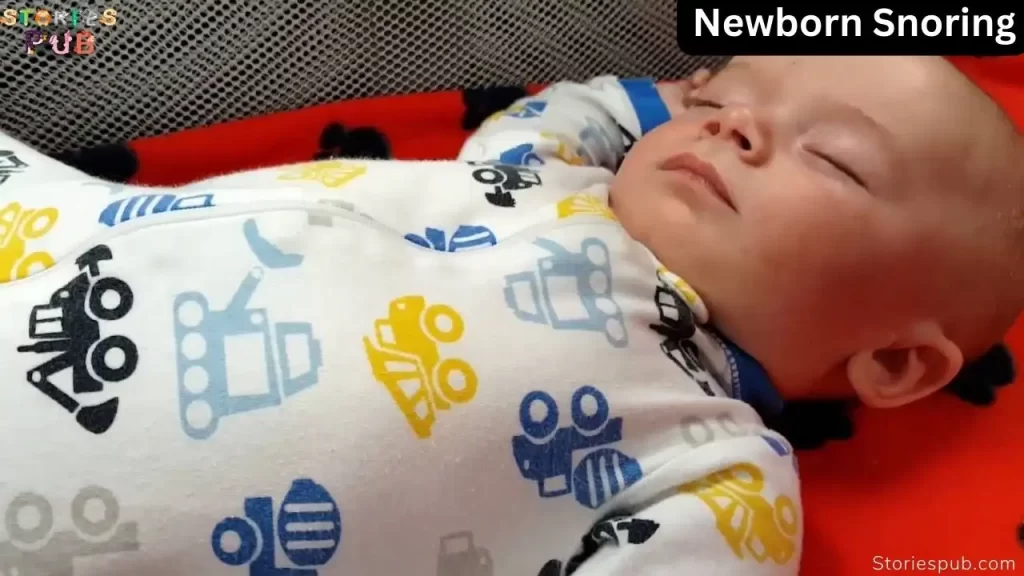Summarize this Article with:
Newborn Snoring : What it is, Causes & Precautions

Having a newborn baby is such an exciting yet sometimes overwhelming experience for new parents. So many changes and questions as you get accustomed to life with a newborn – including the joys of your little one snoring! But what exactly could be causing this cute but strange noise from your precious baby?
It’s important to understand why your infant may be snoring, the potential underlying causes, and what precautions if any need to be taken by parents. From understanding how common it can be among infants to identifying signs of possible medical problems related to snoring in a newborn, we are here with all the information that you need!
What is Snoring?
Snoring is a common sleep-related breathing disorder that occurs when the airways become blocked or restricted. This restriction of airflow results in a loud, rumbling-like noise as we breathe. It can disrupt the snorer and anyone else sharing their bed. Snoring has become an increasingly recognized medical condition that has many causes, from allergies to obstructed nasal passageways.
Treatments range from simple lifestyle changes like sleeping on your side to medical aids such as Anti-Snoring Oral Strips and throat sprays. If snoring is getting in the way of your restful sleep, you should visit a doctor and discuss treatment options to feel refreshed when you wake up each morning.
Snoring in Newborns: Why Does That Happen?
Snoring in newborns can occur due to various reasons such as nasal congestion, enlarged tonsils or adenoids, and abnormalities in the structure of the nose, throat, or mouth. Newborns have underdeveloped nasal passages and throat muscles, making it more likely for them to snore.
Some newborns may also have a condition known as “congenital central hypoventilation syndrome,” which affects their ability to regulate their breathing during sleep. While occasional snoring in newborns is not uncommon and typically not a cause for concern, frequent or loud snoring may be a sign of a more serious underlying condition and should be evaluated by a pediatrician.
Causes of Newborn Snoring
Newborn snoring can be caused by several factors including:
Nasal Congestion: A stuffy or congested nose can lead to snoring in newborns.
Enlarged tonsils or adenoids: Swollen tonsils or adenoids can obstruct the airway and cause snoring.
Abnormalities in the structure of the nose, throat, or mouth: Some newborns may be born with a narrow airway, a cleft palate, or other structural abnormalities that can lead to snoring.
Underdeveloped nasal passages and throat muscles: Newborns have underdeveloped nasal passages and throat muscles, making them more likely to snore.
Congenital central hypoventilation syndrome: This is a rare condition in which newborns have difficulty regulating their breathing during sleep, leading to snoring.
Risks Associated with Newborn Snoring
Newborn snoring can have several risks and consequences, including:
Sleep apnea: Snoring can be a sign of sleep apnea, a condition in which breathing stops briefly during sleep, which can lead to reduced oxygen levels in the body.
Developmental issues: Sleep apnea or other breathing problems can result in disrupted sleep, affecting a newborn’s growth and development.
Behavioral and emotional problems: Poor sleep quality can lead to behavioral and emotional problems such as irritability, decreased attention span, and difficulty with memory.
Cardiovascular problems: Sleep apnea can increase the risk of high blood pressure and other cardiovascular problems.
Risk of SIDS: Snoring in newborns has been linked to an increased risk of sudden infant death syndrome (SIDS).
Home remedies (Prevention) of Newborn Snoring
Several home remedies can help prevent newborn snoring, including:
Keeping the sleeping area clear: Keep the sleeping area clear of any soft objects or loose bedding that could obstruct the airway.
Elevating the head of the crib: Elevating the head of the crib can help keep the airway open and reduce snoring.
Clearing nasal passages: Clearing nasal passages by using a saline nasal spray or bulb suction can help reduce snoring in newborns.
Avoiding the use of a pacifier: Avoiding the use of a pacifier during sleep can reduce the risk of snoring as pacifiers can fall out of the mouth and obstruct the airway.
Maintaining a healthy weight: Maintaining a healthy weight can help prevent snoring as overweight and obese children are more likely to snore.
It’s important to note that while these home remedies may help reduce the likelihood of snoring in newborns, they are not a substitute for professional medical evaluation and treatment if necessary. If there are concerns about a newborn’s breathing or sleep quality, a pediatrician should be consulted.
Is Snoring a sign of a medical condition?
Yes, snoring can be a sign of a medical condition, especially if it is loud, frequent, or accompanied by other symptoms such as gasping or choking during sleep. Snoring can be a sign of obstructive sleep apnea, a condition in which the airway becomes blocked during sleep and breathing stops temporarily. Other medical conditions that can cause snoring include nasal congestion, obesity, alcohol consumption, and aging.
Snoring can also be a symptom of other serious medical conditions such as heart and lung problems and can have negative impacts on sleep quality and overall health. If snoring is causing significant distress or affecting the quality of life, it is recommended to see a doctor for an evaluation.
Conclusion
If your newborn is snoring, it is important to consult with a doctor to rule out any underlying health issues. While many causes of snoring are harmless, some can be indicative of more serious problems. In general, if your baby is comfortable and gaining weight properly, there is no cause for alarm. However, if you have any concerns about your child’s sleep or overall health, don’t hesitate to speak with a medical professional.
Thanks for reading…. Newborn Snoring : What it is, Causes & Precautions
Newborn Snoring
Hello Everyone, How did you like this (Parenting) Newborn Snoring : What it is, Causes & Precautions? if you like this article share your view in the comment box, and don’t forget to share this with your friends on Social Media so they can also redy this. For more keep visiting Storiespub.com.
Suggeted Articles













